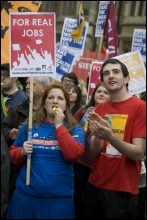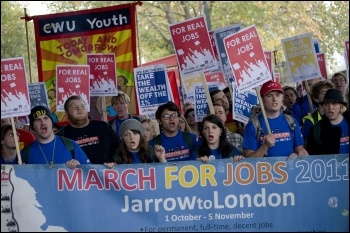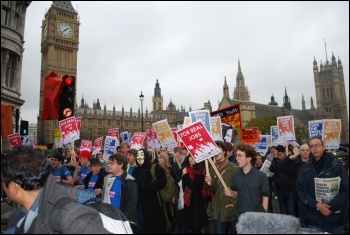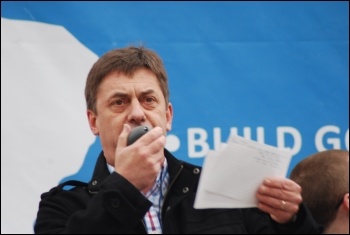On Saturday 5 November the Jarrow March for Jobs came to an end with a demonstration of thousands in central London. All the marchers, organisers and supporters should be congratulated for making the march a huge success. Youth Fight for Jobs (YFJ) will now be focussing on mobilising young people to support the 30 November strikes and to get organised into YFJ groups around the country.
It’s been great to have received so much support from local people. Someone from the Communication Workers’ Union (CWU) named Tony joined us for the ‘leg’ from Ripon to Harrogate – the same leg that we were wrongly reported not to have completed by the Daily Mail, the Sun and the Independent!
He marched with us on the grass verges of a very busy road in the heaviest rain of the entire five weeks, showing us the way into the centre of Harrogate. His support gave us the heart to keep going on that difficult day and we were even more moved when he spoke at the meeting that evening, telling us how inspired he was by our actions.
The following day, when the untruthful articles came out he wrote to the Independent in a rage to stand up for us. It’s support like this and our ability to inspire people like Tony that have made the march so worthwhile.
Ollie Fournier, Cambridge

Photo Paul Mattsson
Walking 330 miles has not been easy; blisters, sprains and near loss of sanity have been commonplace, yet we all kept going.
Sitting now in a London pub as I write this, at a reception put on for us by Waltham Forest Unison and trades council, I can’t help but smile as I look around at my fellow marchers, now friends, at how much we’ve accomplished and at how much solidarity we experienced.
More than anything I feel hope. Hope and excitement that the winds are changing and the working class is rising up. N30 is the start of a huge workers’ movement and from the attitudes to the march, I know it will not be the end! Oh and thanks to all the marchers for making my 21st the best birthday ever!
Stephanie Maston, Bradford, 21

Photo Paul Mattsson
The Jarrow March for Jobs was absolutely inspirational. There were points on the long march where I thought ‘we can beat this government, we can stop the cuts’.
The reason we received so much support was because we put forward a clear programme, an alternative to austerity. Our march struck a chord with what ordinary people are thinking.
The Jarrow March for Jobs is just one part of a huge fightback. Millions of people around the world are saying ‘if the capitalist system can’t afford decent jobs and education, we can’t afford the capitalist system’.
Ian Pattison, Leeds, 22
I think it’s definitely going to be strange for us now the march is over. Every time I could join it when not at college, I was amazed by how high the spirits were and it’s great how well we all got to know each other over the past five weeks.
I’m just hoping that even if the government takes no notice of us, which will probably be the case – or we’ll have more of Cameron’s crocodile tears ‘it’s so sad that all these young people are unemployed’ – I’m just hoping that at least this will inspire more young people to take up our fight and realise that these cuts aren’t going to go away by themselves. It will only get worse from here if people don’t stand up for themselves and others faced with the conditions we’re being pushed into.
Lizi Gray, Newcastle, 17
The Jarrow march has been a very strange experience. It’s been horrible and wonderful. It’s been absolutely fantastic – all the support we’ve had has been brilliant.
We thought it would tail off as we got out of the north but people have been falling over themselves to feed us and make us cups of tea.
Walking 12 miles a day and sleeping on floors is very hard work but knowing that you’re making a difference, that you’re doing something important that’s getting the ideas of fighting back out there and that it has so much public support is amazing.
Bobbie Cranney, Newcastle
We marched to show that the youth will not tolerate the government’s lack of support for young people; that if it will not support us we must work to get rid of their system.
Our march signifies the beginning of this generation’s struggle, and that with our otherwise un-utilised talent we shall bring the government down and bring about a socialist world.
Rhys Harrison, Cardiff
The support down the line was what kept us going. The solidarity shown on my first night in Wakefield, with a bitter brewed just for us and some rousing folk music from Ewan McLennan and others, really set an amazing standard that was met up and down the country.
Nial Vivian, Leeds
The march was a fantastic way of building the fight against the cuts. The fact we were going the whole length of the country was a great way to show as many people as we could that we can fight the Con-Dems. The march really opened my eyes to how important serious activism is.
Michael Wright, Bristol
The most intense few weeks of my life but also the best!
Ryan Preston, Leeds
On Saturday 5 November, the Jarrow marchers completed their 330-mile trek to London. The five demands of the Jarrow March for the government to create jobs, bring back EMA and scrap university fees, save youth services, scrap slave labour workfare schemes and build affordable housing for all were supported by the thousands of young people, trade unionists, workers and pensioners who joined the marchers for the final mile of their journey.
The march was also joined by 106 year old Hetty Bower who had greeted the original marchers when they arrived in London in 1936.
Their supporters met the marchers at the Embankment where a rally was held. Lee Vernon brought solidarity and support from the Young Members Network of the PCS civil servants union. He criticised the ‘madness’ of increasing the pension age while there are a million young people looking for jobs.
Marcher Alex Moore spoke about the incredible support the marchers received since they set off from Jarrow on 1 October. After outlining the devastating effects that unemployment and education cuts are having on young people, he lead the demonstration to Trafalgar Square with chants of “we won’t be a lost generation, fight for jobs and education!”.
The rally also heard from Anastasia Richardson one of the young organisers of the London Slutwalk protest and Billy Hayes, general secretary of the Communication Workers Union.
The demonstration represented the majority, the 99%, who are the ones facing our living standards being crushed while the top 1% are living in complete luxury. Colourful placards were held by everyone from children to pensioners demanding real jobs and free education.
Petition
When the march passed Downing Street, six of the Jarrow marchers handed in a Youth Fight for Jobs petition with thousands of signatures from the people who had supported the march. This petition demanded that the government invests in job creation rather than job destruction and reverses all of the cuts to youth services that had already been made.
The original Jarrow marchers handed in a petition to the Tory prime minister of the time, Stanley Baldwin, who ignored it, doing nothing to help the plight of the unemployed in Britain. Today, we have no illusion that Cameron and Clegg are simply going to look at the petition and answer all of our demands – we need to continue to struggle! But it will show them that young people are not willing to lie down and accept having our futures taken away. We will stand and fight – and we have the support of workers and pensioners too!
A group of the St Paul’s occupiers in London tried to march to join the demonstration but were outrageously kettled by the police for hours. Youth Fight for Jobs stands in solidarity with those involved in the occupy movement in London and elsewhere and defends the right to protest.
As the demonstration entered Trafalgar Square, the marchers were greeted by hundreds of people applauding and cheering them. A fire engine, donated by the Fire Brigades Union (FBU) for the rally, stood in the square with a large Jarrow March banner showing the five demands and photos of the marvellous protests that have happened in every town and city that the march passed through.
Jarrow marcher Ian Pattison introduced the speakers at the final rally and thanked all the trade unions and individuals who had given their support to the march by giving financial donations, food, accommodation and the very useful woolly hats, coats and bags!
Lizi Gray, Jarrow marcher and great-granddaughter of one of the original marchers, described the terrible conditions people like her great-granddad lived in that forced them to march in 1936. She explained that 75 years later we are still living under a government that thinks that millions of people being unemployed is a ‘price worth paying’ to protect big business from a crisis that we didn’t cause.
Today’s Jarrow marchers don’t live in the same poverty as those in the 1930s but we say that there should be no return to the 1930s and we are not going to wait until there is 70% unemployment before we start fighting back!
Trade union support
Trade unionists addressed the rally, all praising the Jarrow marchers for their heroic efforts in demanding a future for young people.
Chris Baugh, assistant general secretary of the PCS, called for the trade union movement to involve the millions of unorganised workers and unemployed in the strikes on 30 November. The strike is about the cuts in pensions for public sector workers but it will also be a display of opposition to the government’s decimation of public services.
Bob Crow, general secretary of the RMT transport union, outlined how the bankers and the rich are able to use their influence on society to get what they want from the government. He received a massive round of applause when he argued that the trade unions should now be saying to the government “unless you give us our demands, we will shut the country down” to stop us paying the price for the bankers’ crisis.
Matt Wrack, general secretary of the FBU, described how there is an alternative to cuts. They will only serve to plunge the economy into further chaos, as we can see with the deepening crisis in Greece.
The Jarrow marchers, as echoed by Matt during the rally, sent a strong message to young people in Britain: you have two choices, you can roll over and take it or you can fight back!
We also heard speeches from Ed Marsh from the National Union of Students and Stephen Hepburn, the Labour MP for Jarrow where the march started.
Hannah Sell, deputy general secretary of the Socialist Party, called on those at the rally to join the Socialist Party in fighting for a socialist alternative. The fact that ordinary people are still having to demand, 75 years after the original Jarrow March, the basic right to a job, a home and an education shows that capitalism as a system is unable to provide for the majority.
Oktay Sahbaz from Day-Mer Youth, a Turkish and Kurdish organisation, called for young people from different races to unite against the government’s attacks. Also, Emily McArthur from the US spoke about the Occupy Boston protest, showing that our struggle is an international one.
There was music from Young Deacon, performing his rap ‘Failed by the System’ about the riots in London and Maddy Carty, singing her song ‘CONDEMn Age’.
Paul Callanan, national organiser of Youth Fight for Jobs, ended the rally with a speech showing the determination to continue our campaign now that the Jarrow March has finished. Young people need to continue to organise in local areas, to link up with and support workers taking action on 30 November and build the fight for our futures!
Becci Heagney, East Midlands Youth Fight for Jobs
No answers from IDS
Alex Moore and Matt Dobson, Jarrow marchers
On the penultimate day of the Jarrow March, six of the marchers went to meet with Secretary of State for Work and Pensions, Iain Duncan Smith (IDS).
We met him in his constituency of Chingford and Woodford Green, and after being shunted from one venue to another we finally spoke to him outside a primary school. Neither he nor his aides seemed to care very much that young people had marched 330 miles to raise concerns about our future – we were given 20 minutes!
Kerry Hitchin, who is about to start training to be a nurse, first raised the issue of the pension age rising to 68, and that she was concerned that she would not be able to provide a quality service at such an age, while also depriving a young person of a job.
IDS claimed that everyone he had spoken to, supported the pension ‘reforms’ and that funding the NHS and pension schemes now had to be under scrutiny as people are living longer.
As expected IDS shrugged his shoulders when we explained that millions of public sector workers were willing to take strike action against his reforms.
But a look of panic spread across IDS’s face when Tony Moore explained that in his home town of Salford, the average life expectancy is 70 – would that mean we can only have two years retirement? IDS’s response was to say it would be more like four!
Bobbie Crannie also raised that she had taken part in the Work Programme where she worked for her dole for six weeks and was promised an interview at the end which was not given.
This was one of the schemes set up by Iain Duncan Smith, however he seemed to have no knowledge of it! What message does it give when a minister denies knowledge of his own programmes? Maybe that he doesn’t give a damn about helping the unemployed find work.
We also raised the Jarrow marchers’ demand for decent social housing for young people. IDS promised that social housing was being built but when pressed upon whether it was publicly owned by local councils or by housing associations, he wouldn’t give a straight answer.
When we attacked his housing benefit reforms IDS had an incredible response. Apparently forcing young people to wait until they are 35 to get a flat is justified because IDS himself lived in a house with a shared bathroom until his mid 30s! We are looking into finding out where IDS spent his heady 20s, but we bet he wasn’t needing to claim housing benefit.
IDS had no real answers, just the usual Tory rhetoric, a clear indication that the Conservatives aren’t even attempting to solve the rise in unemployment.














